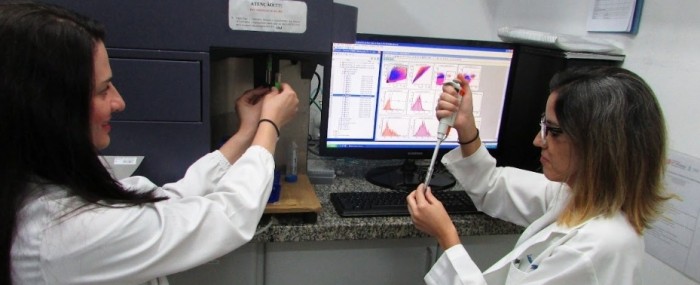
Protein created by Brazilian startup could help treat diseases caused by HPV
12 de março de 2024By Roseli Andrion | FAPESP Innovative R&D – More than 630 million men and women have been infected by human papillomavirus (HPV) worldwide, according to the World Health Organization (WHO). In Brazil, between 9 million and 10 million people are infected, according to estimates, and the number of annual new cases is thought to average some 700,000. Studies have also indicated that about 80% of the sexually active population will be infected by HPV at some time during their lives.
In a search for strategies to treat diseases caused by HPV, researchers at ImunoTera Soluções Terapêuticas, a startup based in São Paulo, Brazil, have developed a protein that stimulates the immune system to eliminate HPV-derived tumors.
Developed as part of a project supported by FAPESP’s Innovative Research in Small Business Program (PIPE), the protein TERAH-7 triggers an immune response to infected cells while they are undergoing malignant transformation.
“We’ve done many experiments and proved its efficacy in preclinical trials involving mice,” said Bruna Porchia Ribeiro, ImunoTera’s chief scientific officer.
The firm aims to conduct clinical trials as soon as possible. “We want to find out how effective the protein is in the real world to treat women with diseases caused by HPV – treatment that avoids surgery and chemotherapy because it leverages the patient’s own immune response,” she explained.
According to Ribeiro, the firm has applied to ANVISA, Brazil’s national health surveillance and drug regulation agency, for a license to produce the protein. “We also need to conduct a pilot test designed to assess its toxicity and prove its safety for use by humans. The project is engaged in these two processes right now,” she said.
Therapeutic vaccine
The firm plans to use TERAH-7 in a therapeutic vaccine. “Most people think of prevention mediated by the response from antibodies when they hear the word ‘vaccine’, but it’s possible for a vaccine to be therapeutic, depending on the target selected,” Ribeiro said.
Instead of undergoing surgery, patients with a cervical lesion caused by HPV will be able to undergo treatment that strengthens the immune response, not to produce antibodies but to activate T cells that recognize cancer cells. “Our vaccine will induce this response so that the T lymphocytes recognize and eliminate diseased cells,” she said.
Patients who have not been given the preventive HPV vaccine and develop the disease will be able to receive this kind of treatment. A dual-dose vaccine that prevents HPV infections is available free of charge in Brazil via the SUS (Sistema Único de Saúde), the national health service, for children aged 9-14, men and women who have had transplants, cancer patients undergoing chemotherapy and radiation therapy, people with HIV/AIDS, and victims of sexual violence. However, adherence is less than 90%, the lower limit recommended by the WHO.
According to a study by Fundação do Câncer, a Brazilian nonprofit, data for the period 2013-20 shows that 76% of girls aged 9-14 received the first dose and 56% received both doses. As for boys in the same age group, 52% took the first dose in 2022. “Unfortunately, the preventive vaccine has not reached sufficient coverage so far. We therefore saw an opportunity to offer an option for the unvaccinated with HPV-related lesions,” Ribeiro said.
TERAH-7 is a fusion protein in which the E7 HPV antigen is genetically fused with a protein that activates the immune system as a therapeutic platform. “The protein functions as an adjuvant, strengthening the immune response to the E7 antigen, which is the target,” she said.
Other diseases
According to Ribeiro, the fact that it is a platform is significant because it can be applied to the treatment of other chronic or infectious diseases. “We’ve tested it for HIV, zika and SARS-CoV-2 in mice. It can also be adapted to other types of tumor with a well-established target, such as breast cancer or prostate cancer, for example. The potential scope is broad,” she said.
A first clinical proof of concept was conducted in partnership with Hospital das Clínicas, the hospital complex run by the University of São Paulo’s Medical School (FM-USP), against cervical cancer precursor lesions caused by HPV. The study proved that the strategy works. In this case, the protein was not injected directly into the patients.
In the context of cancer, the researchers believe TERAH-7 will have to be associated with other forms of treatment, such as chemotherapy, radiation therapy and even surgery, in order to have more chances of being successful. “For lesions, on the other hand, we believe the protein will work on its own, but we’ll have to prove this in clinical trials,” Ribeiro said.
Entirely indigenous
The protein was entirely developed by the team at ImunoTera. “We plan to keep going until it becomes an attractive product to the pharmaceutical industry and institutions that produce immunobiologicals in Brazil. They can produce it on a large scale and offer it to the health ministry and even to other countries,” Ribeiro said.
ImunoTera was founded in 2016 as a spinoff from the University of São Paulo (USP) and is now part of the portfolio of Eretz.bio Biotech, a biotech incubator operated by the Albert Einstein Jewish-Brazilian Charitable Society (SBIBAE). “We currently have a round of private investment open. We want to develop a cancer therapy here in Brazil,” she said.
The firm’s name has a double meaning: “imuno” (immune in Portuguese) refers to the immune system, and “tera” to both therapy (terapia in Portuguese) and the unit of measurement tera, or 1 trillion, roughly the number of cells in the human immune system. TERAH-7 is so named as a portmanteau of tera, HPV and E7.
